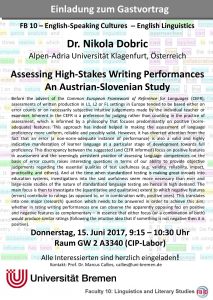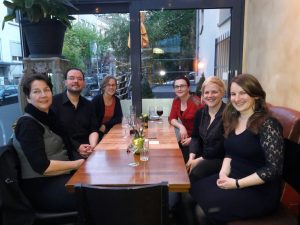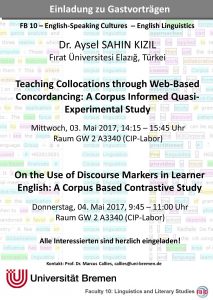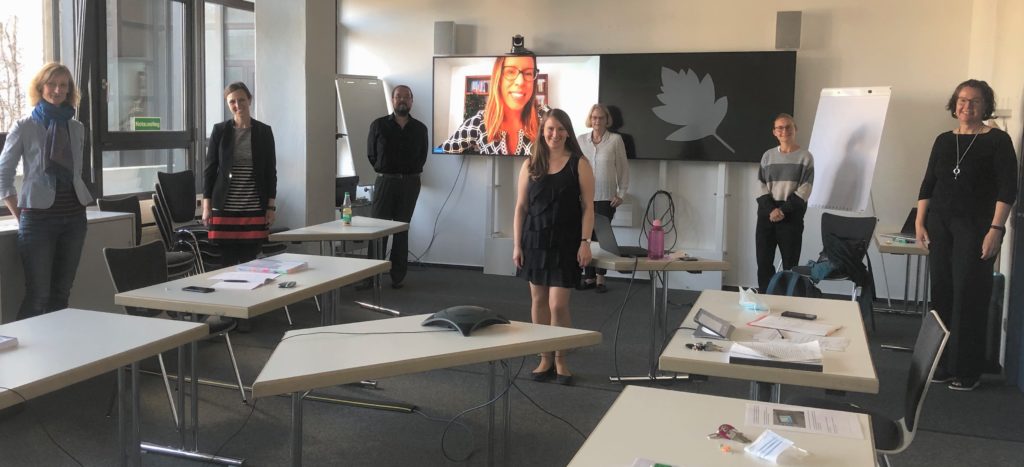 Members of the PhD committee after the successful defense. Picture courtesy of G. Gödecke.
Members of the PhD committee after the successful defense. Picture courtesy of G. Gödecke.
Category Archives: Allgemein
Alexandra Kinne’s PhD dissertation published
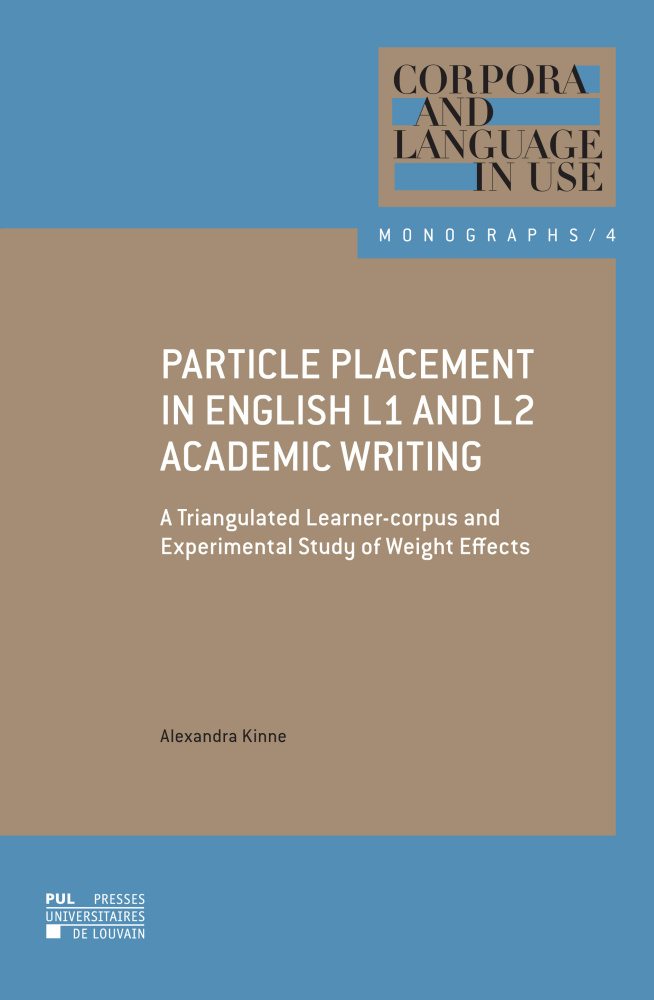
We are pleased to announce that Alexandra Kinne has published the PhD dissertation that she defended in May 2018 with Presses Universitaires de Louvain under the title “Particle Placement in English L1 and L2 Academic Writing. A Triangulated Learner-corpus and Experimental Study of Weight Effects”.
Congratulations, Alexandra!
Update (August 2nd, 2021): A review of the book has recently been published in the International Journal of Corpus Linguistics.
Update (March 2nd, 2023): A second review of the book has recently been published in the International Journal of Learner Corpus Research.
Dissertation defense by Alexandra Kinne
International summer school “Learner Corpus Research – Theory and practical applications”
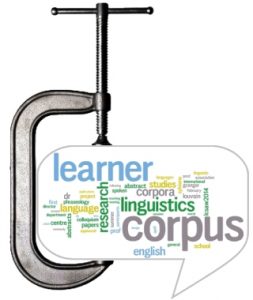 We are pleased to announce that we will host an international summer school on Learner Corpus Research from August 27-31, 2018, organised under the aegis of the Learner Corpus Association.The aim of the event is to introduce researchers into the field of Learner Corpus Research through a series of overview lectures and hands-on sessions.
We are pleased to announce that we will host an international summer school on Learner Corpus Research from August 27-31, 2018, organised under the aegis of the Learner Corpus Association.The aim of the event is to introduce researchers into the field of Learner Corpus Research through a series of overview lectures and hands-on sessions.
The summer school is targeted at both young researchers, e.g. PhD students who have recently embarked on a learner corpus project, but also more experienced researchers from neighbouring fields such as corpus linguistics, SLA or LTA who want to know more about this dynamic, interdisciplinary field of research.
More information about this event can be found here.
CALE team at LCR 2017 in Bolzano
source: Aivars Glaznieks / Twitter
Happy and successful times for two members of the CALE team at this year’s Learner Corpus Research conference in Bolzano/Italy.
Leonie Wiemeyer presented a paper on “Direct quotes, paraphrases, and summaries in L2 academic assignments” and won a book prize as runner-up in the competition for the best paper presented by a PhD student. Congratulations, Leonie!
Marcus Callies was re-elected vice-president of the Learner Corpus Association for another 4 years of office.
Guest lecture by Dr. Nikola Dobric, Klagenfurt
We are happy to have ERASMUS+ guest lecturer Dr. Nikola Dobric from the University of Klagenfurt / Austria visiting us in June 2017. On June 15th, 9:15 to 10:30, he will talk about “Assessing High-Stakes Writing Performances. An Austrian-Slovenian Study“. All welcome!
Research stay and guest lectures by Turkish project partner
From Tuesday, May 2nd to Thursday, May 4th, 2017, our project partner from Firat University in Turkey, Dr. Aysel SAHIN KIZIL, visited the Bremen CALE team.
We had stimulating disussions about future research colloaborations and listened to two most interesting guest lectures by our guest.
26. January 2017: Guest lecture by Seval Özen (Freiburg)
On Thursday, January 26th 2017, our project partner Seval Özen, PhD candidate at Freiburg university, gave a guest lecture on the topic “Multi-Word Verb Usage by Turkish Learners of English: A Corpus-based Study”.
After the first attention-shift from grammar to lexis seen in 1960s, the attention of the last 15 years or so has turned towards lexical groups, i.e. to multi-word units such as collocations, phrasal verbs, chunks, etc. From the 1980s onwards, the increasing availability of large electronic corpora has made it possible to explore vast amounts of authentic language data both qualitatively and quantitatively without difficulty and uncover the highly patterned nature of language use. Whereas formerly multi-word units were treated as peripheral exceptions and linguistic rarities, a substantial body of research now exists to show that natural language use, both written and spoken, largely consists of recurrent word sequences. Therefore, they have increasingly been regarded as important building blocks for language acquisition and use. In the context of foreign or second language learning, multi-word units constitute a particularly interesting phenomenon since they are known to cause problems for learners. One group of multi-word units that causes great difficulty even for advanced learners of English is multi-word verbs. Their acquisition and active usage is a challenge since they are complex both in terms of their grammatical form and their lexical meaning. In this talk, an on-going dissertation project on the use of multi-word verbs by Turkish learners of English will be presented. The focus will be on one sub-group of multi-word verbs investigated in the Turkish sub-corpus of the International Corpus of Learner English (ICLE) – namely phrasal verbs.
Research scholarships for doctoral researchers
Congratulations to three team members who were awared doctoral research scholarships by the University of Bremen in the context of the BremenIDEA out funding initiative. Doctoral researchers of the University of Bremen can receive funding for stays up to 3 months at international research institutions.
- In January 2016, Ekaterina Zaytseva spent a full month in Louvain-La-Neuve/Belgium working with Dr. Magali Paquot at the Centre for English Corpus Linguistics.
- In October 2016, Alexandra Kinne will spend a full month in Granada/Spain working on her PhD dissertation with Dr. Cristobal Lozano at the University of Granada.
- From October to December 2016, Leonie Wiemeyer will spend three months at Boise in Idaho/USA working on her PhD project with Prof. Casey Keck at Boise State University.

 learner varieties. A corpus study of weight effects in L1 and L2 academic writing” at the University of Bremen. Christiane Bongartz (Cologne) acted as third reviewer of the dissertation. Alexandra’s work was awarded the highest distinction “summa cum laude”. Congratulations!
learner varieties. A corpus study of weight effects in L1 and L2 academic writing” at the University of Bremen. Christiane Bongartz (Cologne) acted as third reviewer of the dissertation. Alexandra’s work was awarded the highest distinction “summa cum laude”. Congratulations!
